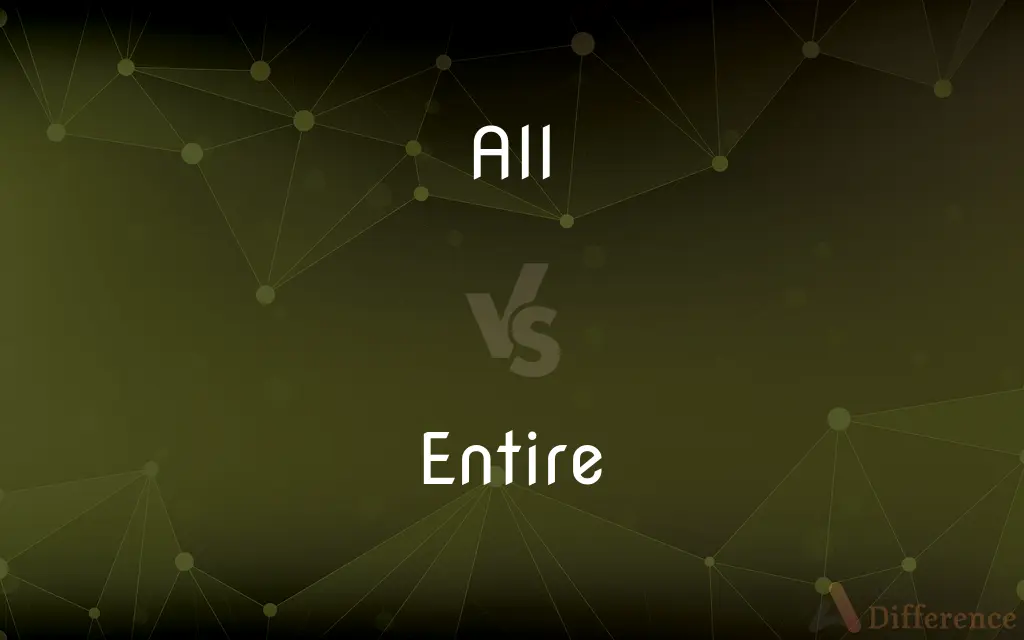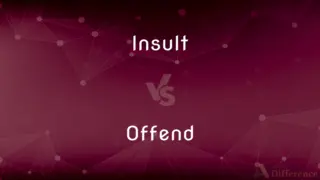All vs. Entire — What's the Difference?

Difference Between All and Entire
ADVERTISEMENT
Compare with Definitions
All
Being or representing the entire or total number, amount, or quantity
All the windows are open. Deal all the cards.
Entire
Having no part excluded or left out; whole
I read the entire book.
All
Constituting, being, or representing the total extent or the whole
All Christendom.
Entire
Constituting the full amount, extent, or duration
We spent the entire day at the beach.
All
Being the utmost possible of
Argued the case in all seriousness.
ADVERTISEMENT
Entire
Not broken, decayed, or divided; intact
An old building with its roof entire.
All
Every
Got into all manner of trouble.
Entire
With no reservations or limitations; complete
Gave us his entire attention.
All
Any whatsoever
Beyond all doubt.
Entire
Not castrated.
All
(Pennsylvania) Consumed; used up; gone
The apples are all.
Entire
(Botany) Not having an indented margin
An entire leaf.
All
(Informal) Being more than one
Who all came to the party? See Note at y'all.
Entire
(Archaic) Unmixed or unalloyed; pure or homogenous.
All
The whole of one's fortune, resources, or energy; everything one has
The brave defenders gave their all.
Entire
The whole; the entirety.
All
Wholly; completely
A room painted all white.
Entire
An uncastrated horse; a stallion.
All
So much
I am all the better for that experience.
Entire
Whole; complete.
We had the entire building to ourselves for the evening.
All
Used as an intensive
Then he got all mad and left.
Entire
(botany) Having a smooth margin without any indentation.
All
Each; apiece
A score of five all.
Entire
(botany) Consisting of a single piece, as a corolla.
All
Every individual or anything of the given class, with no exceptions (the noun or noun phrase denoting the class must be plural or uncountable).
All contestants must register at the scorer’s table.
All flesh is originally grass.
All my friends like classical music.
Entire
Complex-differentiable on all of ℂ.
All
Throughout the whole of (a stated period of time; generally used with units of a day or longer).
Entire
Not gelded.
All
Only; alone; nothing but.
He's all talk; he never puts his ideas into practice.
Entire
Morally whole; pure; sheer.
All
(obsolete) Any.
Entire
Internal; interior.
All
Everything.
Some gave all they had.
She knows all and sees all.
Those who think they know it all are annoying to those of us who do.
Entire
The whole of something; the entirety.
All
Everyone.
A good time was had by all.
We all enjoyed the movie.
Entire
An uncastrated horse; a stallion.
All
The only thing(s).
All that was left was a small pile of ash.
Entire
(philately) A complete envelope with stamps and all official markings: (prior to the use of envelopes) a page folded and posted.
All
Used after what, where, how and similar words, either without changing their meaning, or indicating that one expects that they cover more than one element, e.g. that "who all attended" is more than one person.}} Some dialects only allow this to follow some words and not others.
Entire
Porter or stout as delivered from the brewery.
All
Wholly; entirely; completely; totally.
She was sitting all alone. It suddenly went all quiet.
Entire
Complete in all parts; undivided; undiminished; whole; full and perfect; not deficient; as, the entire control of a business; entire confidence, ignorance.
That ye may be perfect and entire, wanting nothing.
With strength entire and free will armed.
One entire and perfect chrysolite.
All
Apiece; each.
The score was 30 all when the rain delay started.
Entire
Without mixture or alloy of anything; unqualified; morally whole; pure; faithful.
Pure fear and entire cowardice.
No man had ever a heart more entire to the king.
All
(degree) So much.
Don't want to go? All the better since I lost the tickets.
Entire
Consisting of a single piece, as a corolla.
All
Even; just.
Entire
Not gelded; - said of a horse.
All
A quotative particle, compare like.
She was all, “Whatever.”
Entire
Internal; interior.
All
(with a possessive pronoun) Everything that one is capable of.
She gave her all, and collapsed at the finish line.
Entire
Entirely.
All
(countable) The totality of one's possessions.
Entire
A name originally given to a kind of beer combining qualities of different kinds of beer.
All
(obsolete) Although.
Entire
Uncastrated adult male horse
All
All gone; dead.
The butter is all.
Entire
Constituting the full quantity or extent; complete;
An entire town devastated by an earthquake
Gave full attention
A total failure
All
The whole quantity, extent, duration, amount, quality, or degree of; the whole; the whole number of; any whatever; every; as, all the wheat; all the land; all the year; all the strength; all happiness; all abundance; loss of all power; beyond all doubt; you will see us all (or all of us).
Prove all things: hold fast that which is good.
Entire
Constituting the undiminished entirety; lacking nothing essential especially not damaged;
A local motion keepeth bodies integral
Was able to keep the collection entire during his lifetime
Fought to keep the union intact
All
Any.
Entire
(of leaves or petals) having a smooth edge; not broken up into teeth or lobes
All
Only; alone; nothing but.
I was born to speak all mirth and no matter.
Entire
(used of domestic animals) sexually competent;
An entire horse
All
Wholly; completely; altogether; entirely; quite; very; as, all bedewed; my friend is all for amusement.
All
Even; just. (Often a mere intensive adjunct.
All as his straying flock he fed.
A damsel lay deploringAll on a rock reclined.
All
The whole number, quantity, or amount; the entire thing; everything included or concerned; the aggregate; the whole; totality; everything or every person; as, our all is at stake.
Death, as the Psalmist saith, is certain to all.
All that thou seest is mine.
Thou shalt be all in all, and I in thee,Forever.
Trust me not at all, or all in all.
All
Although; albeit.
All they were wondrous loth.
All
Quantifier; used with either mass or count nouns to indicate the whole number or amount of or every one of a class;
We sat up all night
Ate all the food
All men are mortal
All parties are welcome
Have some milk
Some roses were still blooming
Having some friends over
Some apples
Some paper
All
Completely given to or absorbed by;
Became all attention
All
To a complete degree or to the full or entire extent (`whole' is often used informally for `wholly');
He was wholly convinced
Entirely satisfied with the meal
It was completely different from what we expected
Was completely at fault
A totally new situation
The directions were all wrong
It was not altogether her fault
An altogether new approach
A whole new idea
Share Your Discovery

Previous Comparison
Insult vs. Offend
Next Comparison
Examination vs. Review













































